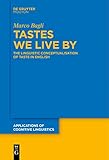Tastes We Live By : The Linguistic Conceptualisation of Taste in English / Marco Bagli.
Material type: TextSeries: Applications of Cognitive Linguistics [ACL] ; 50Publisher: Berlin ; Boston : De Gruyter Mouton, [2021]Copyright date: ©2021Description: 1 online resource (XVIII, 217 p.)Content type:
TextSeries: Applications of Cognitive Linguistics [ACL] ; 50Publisher: Berlin ; Boston : De Gruyter Mouton, [2021]Copyright date: ©2021Description: 1 online resource (XVIII, 217 p.)Content type: - 9783110626773
- 9783110626865
- 9783110630404
- 415 23
- P165 .B34 2021
- online - DeGruyter
- Issued also in print.
| Item type | Current library | Call number | URL | Status | Notes | Barcode | |
|---|---|---|---|---|---|---|---|
 eBook
eBook
|
Biblioteca "Angelicum" Pont. Univ. S.Tommaso d'Aquino Nuvola online | online - DeGruyter (Browse shelf(Opens below)) | Online access | Not for loan (Accesso limitato) | Accesso per gli utenti autorizzati / Access for authorized users | (dgr)9783110630404 |
Browsing Biblioteca "Angelicum" Pont. Univ. S.Tommaso d'Aquino shelves, Shelving location: Nuvola online Close shelf browser (Hides shelf browser)

|

|

|

|

|

|

|
||
| online - DeGruyter Metaphor in Foreign Language Instruction / | online - DeGruyter Alltägliche Hausmusik (1654) : Kritische Ausgabe und Kommentar. Kritische Edition des Notentextes / | online - DeGruyter Studies in Sappho and Alcaeus / | online - DeGruyter Tastes We Live By : The Linguistic Conceptualisation of Taste in English / | online - DeGruyter Business Negotiations in ELF from a Cultural Linguistic Perspective / | online - DeGruyter Studien zur Wirtschafts-, Sozial- und Rezeptionsgeschichte der Antike / | online - DeGruyter Die Verfassung von Cádiz (1812) : Spaniens Sprung in die Moderne, gespiegelt an der Verfassung Kurhessens von 1831 / |
Frontmatter -- Preface -- Acknowledgements -- Contents -- 1 Introduction and theoretical tenets -- 2 Taste -- 3 The words of taste -- 4 The semantic domain of TASTE in English -- 5 The multisensory lexicon of taste -- 6 Categorisation patterns -- 7 The taste of words -- 8 The taste of words today -- 9 Intrafield metaphors -- 10 Conclusions -- References -- Index
restricted access online access with authorization star
http://purl.org/coar/access_right/c_16ec
Taste is considered one of the lowest sensory modalities, and the most difficult to express in language. Recently, an increasing body of research in perception language and in Food Studies has been sparkling new interest and new perspectives on the importance of this sense. Merging anthropology, evolutionary physiology and philosophy, this book investigates the language of Taste in English, and its relationship with our embodied minds. In the first part of the book, the author explores the semantic dimensions of Taste terms with a usage-based approach. With the application of experimental protocols, Bagli enquires their possible organization in a radial network and calculates the Salience index of gustatory terms in both American and British English. The second part of the book is an overview of the metaphorical extensions that motivate the polysemy of Taste terms, with the aid of corpus analysis methods and various texts. This book is the first to review systematically and in a usage-based perspective the role of the sensory domain of Taste in English, showing a more complicated picture and suggesting that its under-representation and difficulty of encoding does not correspond to lack of importance.
Issued also in print.
Mode of access: Internet via World Wide Web.
In English.
Description based on online resource; title from PDF title page (publisher's Web site, viewed 25. Jun 2024)


